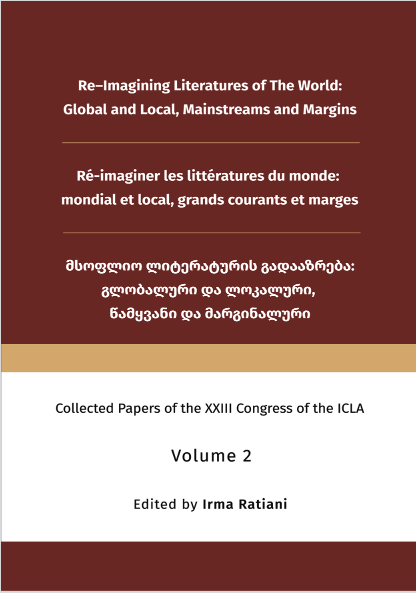Patriotism for Cosmopolitanism: Postcolonial Reading of Vazha-Pshavela’s Essay “Cosmopolitanism and Patriotism”
Main Article Content
ანოტაცია
Vazha-Pshavela is known as one of the most important poets in the history of modern Georgian literature. His epic poems, “Aluda Keterauli,” “Guest and Host” are regarded as masterpieces until today and are adopted into a film, “Vedreba” (“The Plea”), by Tengiz Abuladze, which consist of his trilogy (the others are “Natvris Khe” (“The Wishing Tree”) and “Monanieba” (“Repentance”). Beside poems, he wrote short tales as well as ethnographic or philosophical essays. Today I would like to make my presentation based on his one of the most important essays, “Cosmopolitanism and Patriotism” (1905).
This essay tends to be understood that the poet supports for patriotism against cosmopolitanism especially when considering the context of that time. Before starting our discussion, I would like to introduce this historical context. In the second half of 19th century, Georgian students started studying in university in Russia and they formed a new group with nationalistic ideology to find the way to save the country from Russian colonial rule. The leaders of the group were Ilia Ch’avch’avadze and Akaki Tsereteli (we can see their statue on Rustaveli Ave.). Later they are called as “Pirveli Dasi” (The first group) and are considered as canonical writers. If the first group consists of nationalists, the second, “Meore Dasi” is utopian socialists, and the third “Mesame Dasi” is Marxists. The last one got active since 1898 and harshly criticized the first group and its leader, Ilia Ch’avch’avadze, blaming their nationalistic thought and aristocracy while insisting international and cosmopolitan movement. Finally, this opposition ended up with Ch’avch’avadze’s murder in 1907 while the essay we are now going to discuss is written in 1905–2 years before the murder. Therefore, from this context, it looks natural to understand that with the essay Vazha-Pshavela was supporting the nationalist movement, with which Ch’avch’avadze intended to decolonize Georgia, and it is also natural to consider Vazha-Pshavela as a member of “The First Group.”
Nationalism, of course, is a strong ideology and narrative to fight and struggle against imperialism and colonialism. However, when once decolonization is successfully accomplished, nationalism itself sometimes turns into nothing but a mean to oppress other ethnic minorities, or to cause conflicts with other nations. From this postcolonial point of view, we should be careful when treating nationalism as the idelogy for fighting against empires; we should recognize that nationalism has both sides. We can observe such political situations in African as well as Asian post-colonial countries, and, to some extent, the similar scene can be observed in the post-soviet nations including Georgia, which holds the nationalist ideology of “the First Group” as a core of national narrative as well as the Georgian literary canon until today.
Therefore, when reading the canonical works of Georgian nationalist literature, in our case Vazha-Pshavela, we should pay more attention to this postcoloinial admonish in order that we should not be trapped in the nationalist dilemma (or, in other words, chauvinism). The aim of this paper is to inquire how we can read Vazha-Pshavela’s works without a simple and direct understanding as a part of “nationalist” discourse.
